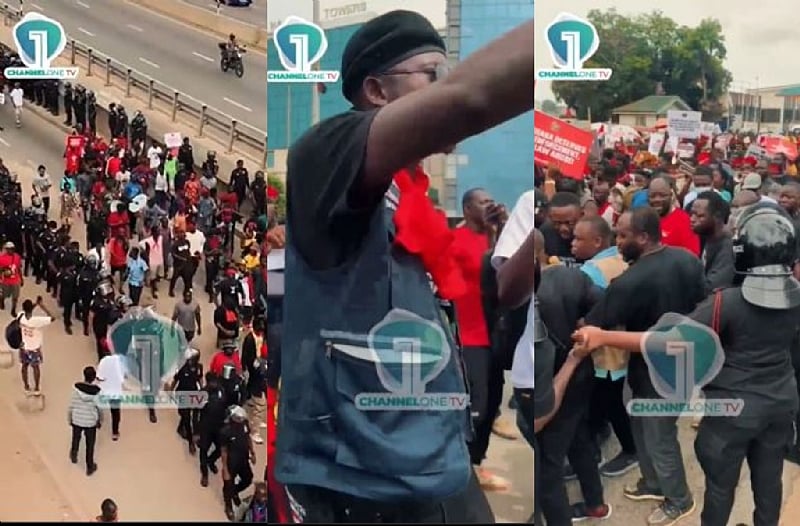The New Patriotic Party (NPP), a prominent political force in Ghana, orchestrated a large-scale demonstration in the capital city of Accra, dubbed the “Yɛn Suro Ahunahuna” protest. This demonstration, drawing hundreds of NPP supporters, was a vocal expression of dissent against what the party perceives as a systematic pattern of harassment and injustice directed at its members. The march commenced at the Obra Spot in Kwame Nkrumah Circle, a significant landmark in Accra, and proceeded towards the headquarters of the Ghana Police Service. The culmination of the protest involved the presentation of a petition to the Inspector-General of Police, Christian Tetteh Yohuno, outlining the party’s grievances and demands.
The atmosphere of the protest was charged with palpable energy. Participants chanted slogans denouncing what they viewed as government oppression and carried placards emblazoned with messages expressing their discontent. Central to the NPP’s accusations was the alleged instrumentalization of the police force by the ruling government to intimidate and suppress political opposition. NPP leaders asserted that politically motivated arrests and investigations, targeting their members and sympathizers, have become increasingly commonplace, creating a climate of fear and undermining democratic principles. They argued that this alleged abuse of power represents a blatant attack on the fundamental rights of citizens and constitutes a grave threat to the integrity of the nation’s democratic processes.
The NPP emphasized that the “Yɛn Suro Ahunahuna” protest was not merely a reaction to isolated incidents but rather represented a broader condemnation of what they perceive as a sustained and orchestrated campaign of intimidation. The demonstration, they argued, was a clear signal that the opposition would no longer passively endure this alleged persecution and would actively resist any attempts to stifle dissent or curtail their political activities. By taking to the streets, the NPP aimed to demonstrate its resolve in defending its members and upholding the principles of democracy and justice.
A significant police presence was deployed along the protest route to manage the large crowds and ensure the demonstration remained peaceful. Both police officials and NPP leaders appealed for calm and restraint from all participants to prevent any escalation of tensions or outbreaks of violence. The authorities recognized the potential for volatility inherent in such large-scale protests and sought to maintain order while respecting the right to peaceful assembly. Meanwhile, the NPP leadership emphasized the importance of maintaining discipline within their ranks to avoid any incidents that could be misconstrued or exploited to discredit their cause.
The NPP’s grievances, articulated through the “Yɛn Suro Ahunahuna” protest, highlight the complex political landscape of Ghana and the ongoing tensions between the ruling government and the opposition. The accusations of politically motivated harassment and the alleged manipulation of state institutions, such as the police force, raise critical questions about the fairness and impartiality of the justice system. The NPP’s claims, if substantiated, point to a potential erosion of democratic norms and the undermining of fundamental rights, issues that demand careful consideration and investigation.
The “Yɛn Suro Ahunahuna” protest serves as a stark reminder of the vital role of a vibrant and independent opposition in a healthy democracy. The ability to freely express dissent and challenge the actions of the government without fear of reprisal is essential for ensuring accountability and preventing abuses of power. The NPP’s demonstration, therefore, represents not only a defense of its own members but also a broader assertion of the fundamental principles upon which democratic societies are built. The outcome of the protest and the government’s response to the NPP’s petition will likely have significant implications for the political climate in Ghana in the coming months and years.














